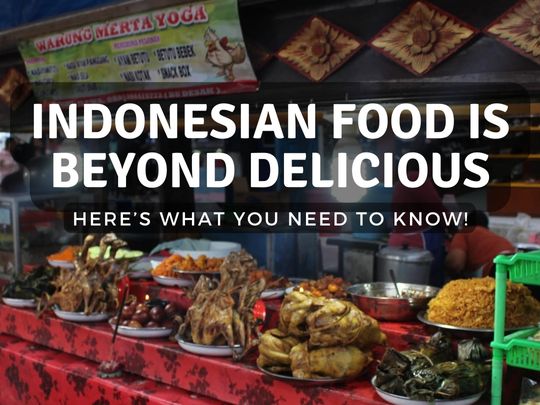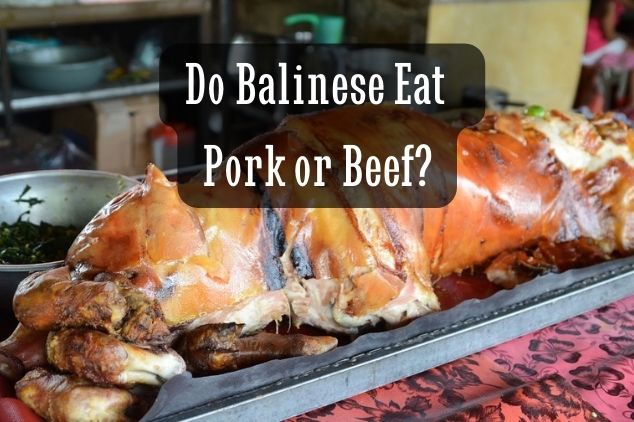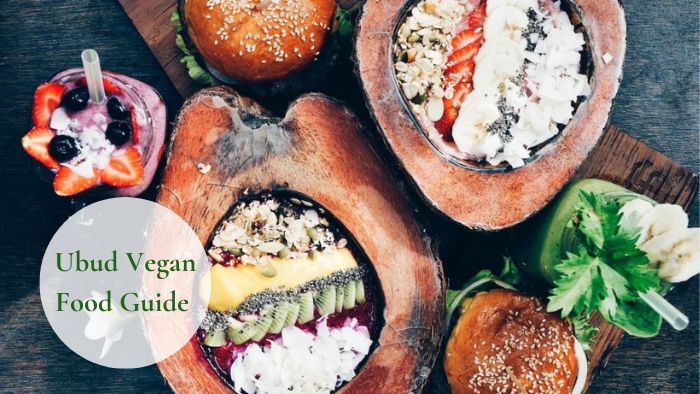Savoring Bali Without Sacrificing Safety: What NOT to Eat in Bali
Indulge in the enchanting experience of savoring Bali, as you delight in the diverse flavors, vibrant culture, and breathtaking landscapes of this tropical paradise.
If you’re planning a trip to Bali, you’re in for a treat when it comes to food. From fresh seafood to flavorful whole roasted pigs (babi guling), Bali has a rich and diverse cuisine that’s sure to tantalize your taste buds.
However, it’s important to be aware of what not to eat in Bali to avoid getting sick and ruining your trip. In this article, we’ll share some tips on what foods to avoid so you can have a safe and enjoyable experience in Bali.
- Eating Food that’s Not Properly Hygienic
To avoid getting sick in Bali, be cautious of where you eat and what you order. Stick to reputable venues and avoid street vendors with unclean facilities. - Eating Street Food
While Bali’s street food can be delicious, there are risks to be aware of. Look for busy vendors with high turnover and avoid food that has been precooked and reheated. - Eating Food that has Been Sitting Out for Too Long
In Bali’s hot and humid climate, food can spoil quickly. Be cautious of food that has been sitting out for too long, and stick to freshly cooked food that is still warm. - Tap Water and Ice Cube from Unknown Sources
Bali’s tap water is not safe to drink, so stick to bottled water and avoid drinks with ice from unknown sources. - Pre-chopped or Packaged Fruits
To stay safe, stick to whole fruits that you can peel yourself. Avoid pre-chopped or packaged fruits that may have been sitting out for too long. - Eating Overly Spicy Food
Too much spicy food can make your stomach upset and make you more likely to get sick from food. Be cautious of dishes labeled as “extra spicy” or “very hot.” - Eat Meat from Unknown Sources or that Looks Questionable
Eating meat from unknown sources or that looks questionable in terms of color or texture can be dangerous. Stick to reputable venues and be cautious of meat from street vendors. - Raw or Undercooked Meat
Eating raw or undercooked meat can increase your risk of contracting foodborne illnesses. Make sure your meat is cooked all the way through before eating it.
[irp posts=”442″ ]
Read on for more information on what not to eat in Bali and tips for staying healthy on your trip. Whether you’re a foodie looking to try new things or just want to enjoy some delicious meals on your vacation, this guide will help you make informed choices and avoid any unpleasant surprises.
→ Immerse yourself in the sights, sounds, and aromas of our state-of-the-art hands-on cooking in “Cooking Class Ubud”
→ Our Food Guide For “Must Try” Traditional Balinese Food During Your Holiday in Bali
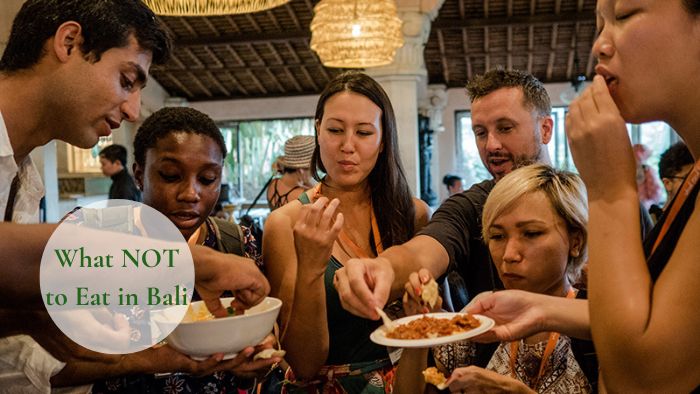
With a little bit of caution and some insider knowledge, you can enjoy all the flavors of Bali without compromising your health.
So What NOT to Eat in Bali Without Sacrificing Safety?
Eating Food that’s Not Properly Hygienic
One of the biggest risks when it comes to food safety in Savoring Bali is consuming food that hasn’t been prepared in a hygienic manner. To avoid getting sick, it’s important to be cautious about where you eat and what you order. Here are some tips to keep in mind:
- Stick to reputable restaurants and cafes that have good reviews and a clean appearance.
- Avoid eating from street vendors that don’t have clean facilities or seem to be handling food improperly.
- Be cautious of buffets or self-serve food stations, as they can be breeding grounds for germs and bacteria.
Eating Street Food
[irp]
Bali is known for its street food, but it’s important to be careful when indulging. While there are many delicious and safe street food options, there are also risks to be aware of. Here are some tips for eating street food safely:
- Look for busy street food vendors with high turnover. The more people eating from a vendor, the less likely it is for the food to have been sitting out for too long.
- Avoid street food from vendors that don’t have clean facilities or seem to be handling food improperly.
- Be cautious of street food that is pre-cooked and then reheated, as this can increase the risk of foodborne illnesses.
→ Immerse yourself in the sights, sounds, and aromas of our state-of-the-art hands-on cooking in “Bali Cooking Class”
→ Our Food Guide For “Must Try” Traditional Balinese Food During Your Holiday in Bali

Eating Food that has Been Sitting Out for Too Long
In Savoring Bali hot and humid climate, food can spoil more quickly than in cooler environments. It’s important to be cautious of food that has been sitting out for too long, as this can increase the risk of foodborne illnesses. Here are some tips to keep in mind:
- Be cautious of food that has been sitting out in the sun or in a warm environment for too long.
- If you’re unsure of how long something has been sitting out, it’s better to err on the side of caution and avoid it.
- Stick to freshly cooked food that is still warm.
[irp]
Tap Water and Ice Cube from Unknown Sources
Bali’s tap water is not safe to drink, so it’s important to stick to bottled water and avoid drinks with ice from unknown sources. Here are some tips to keep in mind:
- Only drink bottled water that has a sealed cap.
- Be cautious of the ice served in drinks at local bars or restaurants, as it may not be made from filtered water.
- If you’re unsure of the source of the water, it’s better to avoid drinks with ice.
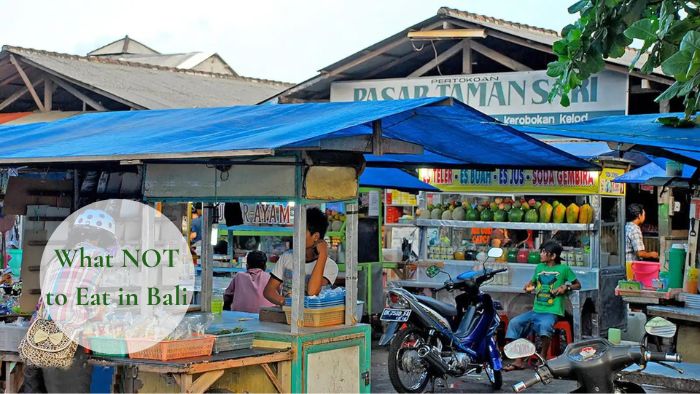
Pre-chopped or Packaged Fruits
Fruits that have been pre-chopped or packaged may have been sitting out for a while and could be contaminated. To stay safe, it’s best to stick to whole fruits that you can peel yourself. Here are some tips to keep in mind:
- Look for whole fruits that you can peel yourself, such as bananas or oranges.
- Avoid pre-chopped or packaged fruits that have been sitting out for a while.
- If you do want to try pre-chopped fruits, make sure they are freshly prepared and have been stored properly.
→ Immerse yourself in the sights, sounds, and aromas of our state-of-the-art hands-on cooking in “Ubud Cooking Class”
→ Our Morning Cooking Class “To Explore The Traditional Market With Your Guide
Eating Overly Spicy Food
Bali’s cuisine can be quite spicy, but be careful not to overdo it. Eating too much spicy food can upset your stomach and make you more susceptible to foodborne illnesses. Here are some tips to keep in mind:
- Be cautious of dishes that are labeled as “extra spicy” or “very hot.”
- Start with milder dishes and work your way up to spicier ones.
- If you do eat spicy food, make sure to drink plenty of water to stay hydrated.

Eat Meat from Unknown Sources or that Looks Questionable
Eating meat from unknown sources or that looks questionable in terms of color or texture can be dangerous and increase your risk of contracting foodborne illnesses. To stay safe, it’s important to be cautious about what meat you eat and how it’s prepared. Here are some tips to keep in mind:
- Stick to reputable restaurants and cafes that have good reviews and a clean appearance.
- Be cautious of buying meat from street vendors that don’t have clean facilities or seem to be handling food improperly.
- Check the color and texture of meat before eating it; if it looks slimy or discolored, it’s best to avoid it.
[irp]
Raw or Undercooked Meat
Eating raw or undercooked meat can be dangerous and increase your risk of contracting foodborne illnesses. To stay safe, it’s important to make sure your meat is cooked all the way through before eating it. Here are some tips to keep in mind:
- Make sure your meat is cooked to the appropriate temperature; for example, poultry should be cooked to an internal temperature of 165°F (75°C).
- Avoid eating raw or undercooked eggs, as they can carry salmonella.
- Be cautious of dishes that include raw or undercooked meat, such as steak tartare or sushi.
By following these tips and being cautious of what you eat and where you eat it, you can enjoy Bali’s delicious cuisine without compromising your health.

Remember to always prioritize food safety, and if you do get sick, seek medical attention right away. With a little bit of common sense and some insider knowledge, you can have a safe and enjoyable trip to Bali.
→ Immerse yourself in the sights, sounds, and aromas of our state-of-the-art hands-on cooking in “Cooking Classes Ubud”
→ Our Food Guide For “Vegan Food” When You’re in Ubud
Safest Food to Eat in Bali
Stick to Whole Fruits and Vegetables
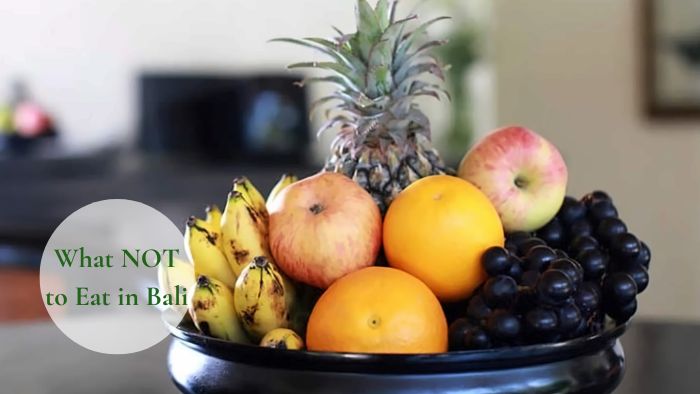
When it comes to produce in Bali, it’s best to stick to whole fruits and vegetables that you can peel yourself. This will ensure that you’re not consuming any pre-chopped or packaged fruits that may have been sitting out for too long.
Bali has a rich variety of fresh fruits and vegetables, so don’t be afraid to try something new. Some of the safest options include mangosteen, rambutan, orange, snakeskin fruit, bananas, papayas, pineapples, watermelon, dragon fruit, and mangoes.
→ Immerse yourself in the sights, sounds, and aromas of our state-of-the-art hands-on cooking in “Cooking Classes Ubud”
→ What We Grow on The Farm? Check here “Our Organic Farm Produce
[irp]
Fresh Seafood is Usually Safe
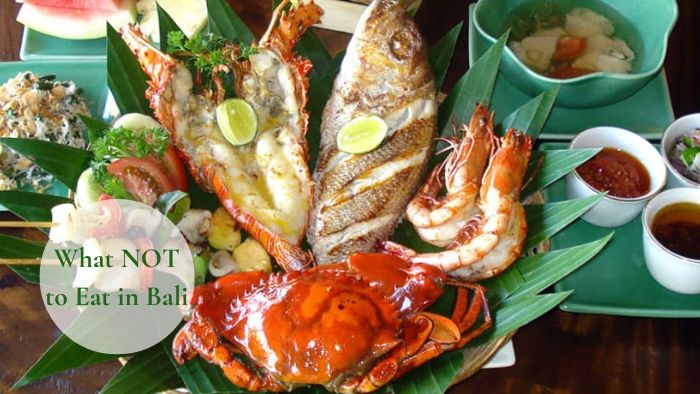
Because Bali is on the coast, fresh seafood is easy to find and is usually safe to eat. However, it’s important to be cautious of where you order seafood from. Stick to reputable restaurants and cafes that have good reviews and a clean appearance.
If you’re not sure about the safety of a particular seafood dish, it’s better to err on the side of caution and avoid it.
[irp]
Grilled and Stir-Fried Dishes
Grilled and stir-fried dishes are usually a safe bet in Bali, as they are cooked at high temperatures and tend to be free of sauces or toppings that may be questionable. Look for dishes that are cooked fresh to order, and be sure to ask about any unfamiliar ingredients before ordering.
Indonesian-Style Soups
Indonesian-style soups such as soto ayam (chicken soup) or sayur asem (clear soup) are usually safe to eat in Bali, as they are cooked at high temperatures and contain plenty of vegetables and spices. Be careful of soups with raw or undercooked ingredients, and only eat at places with good reputations.
Fresh Whole Young Coconut
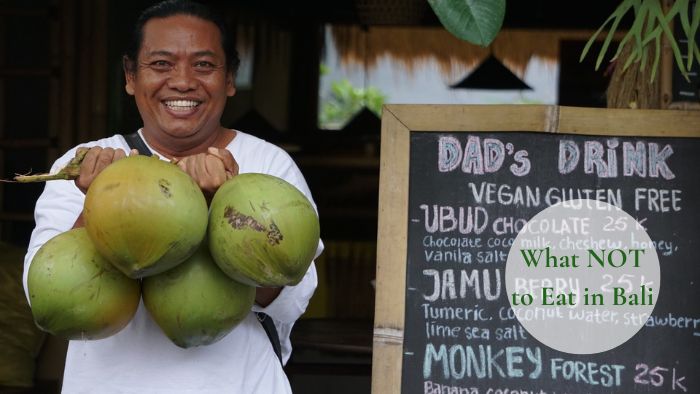
One of the safest and healthiest drinks you can enjoy in Bali is fresh whole young coconut. Not only is it cheap and widely available, but it’s also packed with essential nutrients and electrolytes that can help you stay hydrated in the hot and humid climate. Plus, once you’re done drinking the coconut water, you can scoop out the soft and delicious meat inside for a healthy snack.
→ Our Food Guide For “Vegan Food” When You’re in Ubud
Avoid Tap Water and Ice Cube From Unknown Sources
As mentioned earlier, it’s best to stick to bottled water and avoid tap water and ice from unknown sources. If you’re not sure about the safety of a particular beverage, it’s better to err on the side of caution and skip it altogether.
By following these tips and being cautious of what you eat and where you eat it, you can enjoy Bali’s cuisine without compromising your health. Remember to prioritize food safety, and don’t be afraid to ask questions about how your food is prepared.
[irp]
Is it Safe to Eat Seafood in Bali?
- Stick to Reputable Restaurants and Cafes
One of the best ways to ensure that the seafood you’re eating is safe in Bali is to stick to reputable restaurants and cafes that have good reviews and a clean appearance. Avoid street vendors or markets that don’t have clean facilities or seem to be handling seafood improperly. - Check the Freshness of the Seafood
It’s important to check the freshness of the seafood before ordering it. If it smells overly fishy or has a slimy texture, it’s best to avoid it. Look for seafood that is cooked fresh to order, and be cautious of raw or undercooked seafood, as it can increase your risk of foodborne illnesses. - Be Cautious of Shellfish and Bottom-Feeding Fish
Shellfish and bottom-feeding fish are generally higher in toxins and pollutants, so it’s best to be cautious when consuming them. Stick to safer options such as shrimp, squid, and fish that feed higher in the food chain. - Be Mindful of Accompaniments
Be cautious of accompaniments that come with your seafood, such as dipping sauces or toppings. Make sure they’re freshly made and not sitting out for too long. If you’re unsure about the safety of a particular seafood dish, it’s better to err on the side of caution and avoid it.
[irp]
By being cautious about what you eat and where you eat it, you can safely enjoy Bali’s delicious seafood cuisine. Remember to prioritize food safety, and don’t be afraid to ask questions about how your food is prepared.
→ Our Food Guide For “Vegan Food” When You’re in Ubud
Is It Safe to Eat Street Food in Bali?
- Look for Busy Street Food Vendors with High Turnover
One way to ensure the safety of street food in Bali is to look for busy street food vendors with high turnover. The more people eating from a vendor, the less likely it is for the food to have been sitting out for too long. It’s also a good sign that the food is fresh and delicious. - Be Cautious of Street Food Vendors That Don’t Have Clean Facilities
It’s important to be cautious of street food vendors that don’t have clean facilities or seem to be handling food improperly. If a street food vendor’s facilities look dirty or unsanitary, it’s best to avoid eating there. - Stick to Street Food That is Cooked Fresh to Order
It’s generally safer to stick to street food that is cooked fresh to order rather than pre-cooked and reheated. This ensures that the food is being cooked at high temperatures and hasn’t been sitting out for too long. - Avoid Street Food That Includes Raw or Undercooked Meat or Eggs
Street food that includes raw or undercooked meat or eggs can increase your risk of foodborne illnesses. It’s best to avoid these types of street food dishes or make sure they are cooked thoroughly before eating. - Be Mindful of What You Drink with Your Street Food
Be cautious of what you drink with your street food, as contaminated water or ice cubes can also cause foodborne illnesses. Stick to bottled water and avoid drinks with ice from unknown sources.
[irp]
By being mindful of where you eat and what you order, you can safely enjoy Bali’s delicious street food cuisine. Remember to prioritize food safety, and don’t be afraid to ask questions about how your food is prepared. With a little bit of common sense and some insider knowledge, you can have a safe and enjoyable culinary adventure in Bali.
→ Join One of Our “Culinary Adventure” In The Village
Can You Drink Ice in Bali?

- Stick to Bottled Water and Avoid Ice from Unknown Sources
The safest way to avoid waterborne illnesses in Bali is to stick to bottled water and avoid ice from unknown sources. Be cautious of drinks that come with ice, and always ask if the ice is made from bottled water before consuming it. - Look for Reputable Venues with Clean Facilities
When in doubt, it’s best to look for reputable venues with clean facilities that prioritize food safety. This is especially important when it comes to ice, as it’s often overlooked as a potential source of contamination. - Make Your Own Ice
One way to ensure the safety of your ice in Bali is to make your own ice. If you’re staying in a hotel or villa, ask if you can make your own ice using bottled water. This way, you can be sure that the ice is safe to consume. - Use Pre-Packaged Ice from Reputable Stores
If you’re buying ice from a store or market in Bali, look for pre-packaged ice from reputable brands. This ice is usually made with filtered water and is safer to consume than ice from unknown sources. - Avoid Drinks That Are Made with Ice from Unknown Sources
If you’re unsure about the safety of a particular drink or piece of ice, it’s better to err on the side of caution and avoid it altogether. Stick to bottled water and drinks that are made with ice from reputable sources to minimize your risk of waterborne illnesses.
[irp]
By being cautious of where and what you drink, you can safely enjoy your time in Bali without worrying about waterborne illnesses. Remember to prioritize food safety, and don’t be afraid to ask questions about the safety of ice and water before consuming them.
How to Eat Cheaply in Bali
Look for Local Warungs or Food Stalls
One of the best ways to eat cheaply in Bali is to look for local warungs or food stalls that serve traditional Indonesian food. These places often offer delicious and filling meals at affordable prices, and they’re a great way to experience the local cuisine.
[irp]
Be Willing to Venture off the Beaten Path
Don’t be afraid to venture off the beaten path and explore the less-touristy areas of Bali. This is where you’re more likely to find authentic and affordable food options, as opposed to the more expensive and touristy areas.
Eat Like a Local
One way to eat cheaply in Bali is to eat like a local. Look for dishes that are popular among the locals, and try to avoid Western-style restaurants or international cuisine, as these tend to be more expensive. or even if you interest to see how Balinese food is cook, consider to join one of our cooking class on the organic farm in the village with your friends of family.
Avoid High-End Restaurants and Touristy Areas
High-end restaurants and touristy areas tend to have higher prices, so it’s best to avoid them if you’re on a budget. Instead, look for local eateries and food stalls that offer affordable and delicious meals.
[irp]
Share Meals or Order Small Plates
If you’re traveling with a group, consider sharing meals or ordering small plates to save money. This is a great way to try a variety of dishes without breaking the bank. Many restaurants and warungs offer family-style dishes that are meant to be shared, or you can order several small plates to create a tapas-style meal.
Not only will you get to try more dishes, but you’ll also save money on food and reduce food waste. Plus, sharing meals is a great way to bond with your travel companions and try new foods together.
So next time you’re dining out in Bali, consider sharing a meal or ordering small plates for a budget-friendly and delicious experience.
By being willing to explore and try new things, you can enjoy delicious and affordable food in Bali. Remember to prioritize your budget and be mindful of your spending, and don’t be afraid to ask the locals for recommendations on the best places to eat.
→ Join One of Our “Culinary Adventure And Merge in The Balinese Culture” In The Village
[irp]
A Well Explain Video of Bali Belly – How to Avoid It and Treat It
In this helpful video, a twin travel explains what Bali belly is, what the symptoms are, and how you can avoid it. She also provides tips on what to do if you do get sick, including staying hydrated, getting plenty of rest, and taking over-the-counter medications like Pepto-Bismol or Imodium.
By following these tips and being cautious about what you eat and drink in Bali, you can reduce your risk of getting Bali belly and enjoy your trip to the fullest.
Conclusion:
In summary, it’s important to be cautious of what you eat in Bali to avoid foodborne illnesses. Avoiding certain foods, such as raw or undercooked meat, questionable seafood, and street food that is not properly handled or cooked, can go a long way toward keeping you safe and healthy during your travels. Be mindful of where you eat and what you order, and prioritize food safety above all else.
[irp]
If there’s anything we missed or if you have any additional tips for staying safe while eating in Bali, please feel free to share them in the comments below.
We hope that this blog post has been helpful in preparing you for your culinary adventure in Bali. If you found this post useful, please consider sharing it with your friends and family who are planning a trip to Bali.
If you’re interested in learning more about Bali cuisine and its culture, be sure to check out our related blog posts here. From exploring Bali’s beautiful beaches to learning about its rich history and traditions, we have something for everyone. Thank you for reading, and happy travels!

